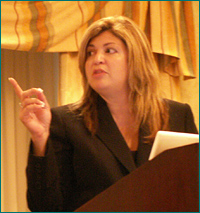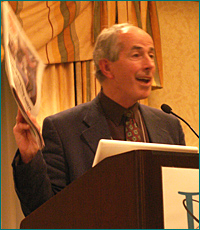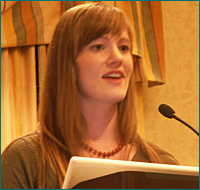PANEL HIGHLIGHTS

Liz George, Co-Editor, Baristanet.com
Richard Anderson, President, VillageSoup.com
Courtney Lowery, Managing Editor, NewWest.net
OVERVIEW
New models of citizen journalism have filled gaps in local news coverage and helped mainstream media outlets broaden community participation. But, for the most part, the profits and revenue generated by print products have eluded online publications.
To keep their sites operating and expanding, some creators of regional and local online news sites are turning to new advertising models and separate revenue streams. The regional news site, NewWest.net, has launched a conference series and sponsored wireless computer connections in coffee shops to help fund its operations. The creators of VillageSoup.com feature on-demand online advertising for local merchants with last-minute sales or promotions.
They also are learning that the basic rules of the news business apply equally to their ventures. Good stories and frequent postings drive the readership traffic that advertisers want.
“What you really want, and what’s really going to sustain you, are the people who are going to bookmark you and come to you every morning, every afternoon, every night before they go to bed at night,” said NewWest.net Managing Editor Courtney Lowery. “Those are the people that you have to win over.”
Liz George, Co-Editor, Baristanet.com,
Essex County, N.J.
 With a name inspired by the modern version of the neighborhood watering hole, Baristanet.com delivers an edgy blend of local comings and goings, community musings and all things related to food and real estate in three affluent New Jersey communities.
With a name inspired by the modern version of the neighborhood watering hole, Baristanet.com delivers an edgy blend of local comings and goings, community musings and all things related to food and real estate in three affluent New Jersey communities.
It also has delivered readers – recording 140,000 page views in September, up from 70,000 a year earlier – and advertisers have taken notice.
Along with the site’s new interactive teardown map, which chronicles the address of every older home in the community being replaced by something newer and bigger, the site features a standing billboard advertisement, rotating side page ads and paid classifieds. (Twenty dollars a month for 30 words; $40 to include a photo.)
The site sells for $1,000 a month a rotating ad at the top of its main page, and side ads that also rotate and sell for $300 a month.
The revenue helps pay $500 a month for technical support and $1,000 a month for a regular contributor, a citizen journalist trained by the site’s two professional editors.
The site’s success comes from its content, said Liz George, who’s also co-owner of Baristanet.com. It is not afraid to ruffle feathers, whether it is taking on local politicians or posting a query about the homely exterior of a local bank branch.
“It’s really whatever they want, we’re going to give them,” George said. “And we’re going to try to give them things that they don’t even know they want, and we’re going to give them things that entertain us, and that’s what’s sustained us, I think.”
Richard Anderson, President, VillageSoup.com,
Camden, Maine
 Other media outlets might have passed on the story of Aubrey Young. But when the 80-year-old man went missing, the frequent postings about his case on VillageSoup.com prompted a call to local police and led to the discovery of a dehydrated, but safe, Young.
Other media outlets might have passed on the story of Aubrey Young. But when the 80-year-old man went missing, the frequent postings about his case on VillageSoup.com prompted a call to local police and led to the discovery of a dehydrated, but safe, Young.
It is the kind of story that Richard Anderson says illustrates how VillageSoup.com has succeeded in creating intensely local, online daily news sites supported and supplemented by a weekly print edition. His model works, he says, for communities of 20,000 to 40,000 people.
The goal is to capitalize on the different strengths of online and print for news delivery and for advertisers – and to drive users back and forth between the two brands.
“Research shows that 50 percent of the market contains non-readers, non newspaper readers, and 75 percent of the market contains non-newspaper advertisers,” Anderson said. “So there’s a huge opportunity out there to solve the problems or the needs of those people who are not looking to the newspapers.”
Among the steps VillageSoup.com has taken to build online revenue:
- On-demand advertising. Online posts feature last-minute sales or promotions that would be outdated in the weekly print edition.
- Enhanced directory listings. Advertisers can pay for featured listings in the business directories posted at VillageSoup.com.
- Online auctions. Local businesses can sell products through the web sites continuous online auction, with proceeds going to the news site as an advertising credit.
Courtney Lowery, Managing Editor, NewWest.net,
Missoula, Mont.
 When it launched in February 2005 with investor backing, NewWest.net came with a bold billing, calling itself The Voice of the Rocky Mountains. It also had a bold goal – to be a profitable publication within two years.
When it launched in February 2005 with investor backing, NewWest.net came with a bold billing, calling itself The Voice of the Rocky Mountains. It also had a bold goal – to be a profitable publication within two years.
Managing Editor Courtney Lowery said the site attracts advertisers to its 10 local sites with a blend of professional and non-professional journalism, blogs and commentary, all focused on the unique issues of the American West.
The effort is staffed by three full-time and two part-time workers and 12 regional paid contributors.
“We’re really trying to emphasize that direct, conversational style that online media has really provided the opportunity for, and blend that with original reporting that really anchors the brand,” Lowery said.
The publication also has sought diverse funding streams, including:
- Hosting conferences and events on regional issues, such as land use.
- Publishing a regional magazine, coming soon, to provide advertisers with a print vehicle.
- Offering custom publishing services.
- Launching an indoor advertising service.
- Hosting wireless Internet connections at area coffee shops.
“The thing that’s always going to drive traffic, that’s always going to drive readership, that’s always going to drive advertising is your content, whether that be a fantastic platform for discussion, or really good information, really investigative reporting, engaging writing,” Lowery said. “Those kinds of things are what people come back for, and that’s what has kept us sustainable.”
Lowery has learned that a little payment for content, $25 to $50, “goes a long way.” All the site’s writers are also asked to market their stories and shop for links on other sties.
Jump to other panel summaries:
Panel 1: New Kinds of Hyperlocal Start-ups
Panel 2: Solo-jos with Community Impact
Panel 3: Mainstream Media: Past Lessons, Future Vision
Panel 4: Building Sustainability
Panel 5: Citizen Television Correspondents
First Release: Highlights of Phase 1 Ford-funded study of citizen media projects







